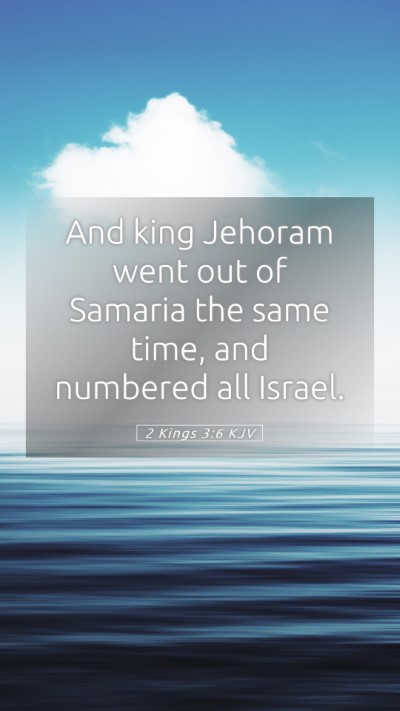Understanding 2 Kings 3:6: Biblical Exegesis and Commentary
In exploring 2 Kings 3:6, we delve into a crucial moment of Israel's history. This verse speaks to the reign of Jehoram, the son of Ahab, who became king of Israel. The passage brings forth themes of leadership, divine guidance, and the dynamics of inter-kingdom relationships during a time of military conflict.
Bible Verse Meaning
The meaning of Bible verses often requires thorough examination. In 2 Kings 3:6, we observe that Jehoram's rise to power is marked by immediate military endeavors, indicating a reaction to the threats posed by Moab. This verse encapsulates not only the king's authority but also God's involvement in Israel's affairs.
Contextual Analysis
Understanding Scripture necessitates an exploration of the historical context. Jehoram assumed the throne after his brother Ahaziah was killed, and he faced immediate tensions with the Moabites, who had revolted against Israel's dominion. Such uprisings were frequent in this era, reflecting the volatile political landscape of the time.
Key Insights from Public Domain Commentaries
-
Matthew Henry's Commentary:
Henry emphasizes the need for Israel to seek divine assistance. He points out that Jehoram’s actions reflect both his human reliance on political power and his obscure pursuit of God's guidance, contrasting the practices of his father Ahab.
-
Albert Barnes' Notes:
Barnes elaborates on the significance of Jehoram's military action. He describes the political backdrop, noting that the revolt of Moab was a direct challenge to Israel’s authority, necessitating the king's immediate military response.
-
Adam Clarke's Commentary:
Clarke highlights the importance of understanding the broader theological implications. He states that although Jehoram sought to stabilize his kingdom through military might, the underlying spiritual conflict was vital, thus complicating the king's reliance on impressions rather than seeking prophetic counsel.
Scripture Analysis
This verse illustrates the multifaceted nature of leadership in the Old Testament and the requirements for divine favor. Jehoram's kingship must be viewed through a lens of both political ambition and the need for spiritual integrity. His ascension represents a pivotal moment that carries significant consequences for Israel’s fate.
Application to Daily Life
Applying Bible verses to daily life involves recognizing the blend of human and divine elements present in leadership and decision-making. Just as Jehoram faced external pressures, modern individuals confront personal and professional challenges that require both tactical planning and spiritual consideration.
Cross References
The following scriptures provide additional context and insight:
- 1 Kings 22:51-53 - Jehoram's background and the influence of Ahab.
- 2 Kings 1:17 - Context of Ahaziah's reign and the prophetic influence during the transition of power.
- 2 Chronicles 21:5-6 - Further details regarding Jehoram’s character and reign.
Conclusion
Understanding 2 Kings 3:6 necessitates a comprehensive approach combining biblical exegesis and relevant commentary. This verse serves as a reminder of the profound impact of leadership decisions in history while reinforcing the need for divine guidance in the face of challenges. Engaging with this scripture provides invaluable Bible study insights and enriches our Bible verse interpretations.


